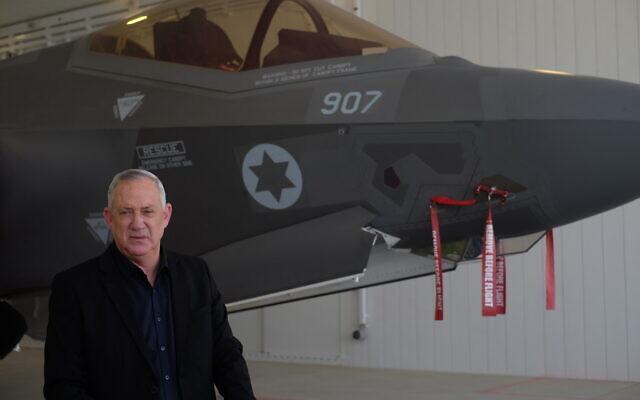Defense minister requests attorney general look into intelligence officials quoted by Israeli, foreign press on strike at Iran’s Natanz nuclear site
Defense Minister Benny Gantz on Monday called for a high-level investigation into recent apparent leaks to the press by Israeli officials regarding recent attacks on Iran that have been widely attributed to Israel’s Mossad spy service, saying they were “damaging to our troops, to our security and to the interests of the State of Israel.”
Gantz referred specifically to comments regarding Sunday’s alleged attack on Iran’s Natanz nuclear facility that were attributed to unnamed “intelligence officials” and “Western officials,” whom the defense minister indicated he believed were in fact Israeli officials.
“This ‘Western officials’ is nonsense,” Gantz told reporters on Monday, following meetings with US Defense Secretary Lloyd Austin, who is visiting Israel this week.
The defense minister’s comments also came days after the Haaretz newspaper reported that an Israeli official had accidentally informed a foreign news outlet about an Israeli special forces operation in advance, not aware that the date of the mission had been changed at the last minute. That reportedly prompted a frantic effort to get the outlet to refrain from reporting on the incident in order to avoid putting the soldiers at risk.
“This is damaging to our forces, to our security and to the interests of the State of Israel, and I think that there needs to be a deep investigation,” he said.
Gantz was also asked if he harbored any concerns that Prime Minister Benjamin Netanyahu, whose office directly controls the Mossad, was acting not out of national security considerations but out of his own political interests, raising the specter of war in order to pressure potential allies into joining his government coalition.
“I think the prime minister has extensive experience in the political-diplomatic field and I wouldn’t belittle that. I think that all other considerations must be removed, and I hope that is what he is doing,” Gantz said.
The defense minister said he was calling for a probe “at the highest possible level” by the Shin Bet security service and by Military Intelligence’s Information Security Department. Asked who he believed was responsible for the leaks, the defense minister said he “did not specifically where it’s coming from, but I know where it’s not coming from (Gantz’s office), and it has to stop.”
“We cannot act when everyone is chattering on with their opinion. We cannot accept these winks and fairytales from ‘Western officials,’” Gantz said.
Later on Monday, the defense minister’s office said he had officially filed a request with Attorney General Avichai Mandelblitt, who it said was the appropriate figure to conduct such a probe.
Gantz stressed that he would not comment on the veracity of the claims or discuss any Israeli operations “if there were any, weren’t any or will be any.”
Israel officially maintains a policy of ambiguity regarding its activities against Iran, generally save for those that are in direct retaliation for attacks initiated by Tehran or its proxies.
The morning after the unidentified intelligence officials told the press that the Mossad was responsible for the issues at Natanz, Iran publicly accused Israel of carrying out the attack and threatened retaliation.
“The Zionists want to take revenge on the Iranian people for their success in lifting the oppressive sanctions,” Iranian Foreign Minister Mohammad Javad Zarif was quoted by Iranian press as saying, “but we will not allow it and take revenge on the Zionists themselves.”
Zarif added that older, first-generation centrifuges at the site that were damaged in the alleged Israeli attack would be replaced with newer, more powerful machines, some of which Iran has already been using in breach of the 2015 nuclear deal.
“If they think our hand in the negotiations has weakened, this will happen to strengthen our position… The negotiating parties should know if they faced an enrichment facility with 1st generation centrifuges, now Natanz can be full of advanced centrifuges.”
In addition to an ongoing, largely covert fight on the nuclear front, Tehran and Jerusalem are engaged in a maritime shadow war, with both sides blaming the other for explosions on vessels.
In recent months, at least two Israeli-owned cargo ships have been damaged in alleged Iranian attacks, one in the Gulf of Oman and the other as it was sailing to India.
Apparently in response, last week, Israeli commandos allegedly attacked a suspected Iranian military command ship, the MV Saviz, off the coast of Yemen, damaging it with limpet mines.
Netanyahu appeared to refer to the recent events against Iran at a ceremony honoring the country’s security forces on Sunday night, saying that the fight against the Islamic Republic was a massive undertaking.
On Monday, after a meeting with Austin, Netanyahu added, “In the Middle East, there is no threat more dangerous, serious and pressing than that posed by the fanatical regime in Iran.”
Citing Iran’s alleged pursuit of nuclear weapons, arming of terror groups, and calls for Israel’s annihilation, he added, “Mr. Secretary, we both know the horrors of war. We both understand the importance of preventing war. And we both agree that Iran must never possess nuclear weapons. My policy as prime minister of Israel is clear — I will never allow Iran to obtain the nuclear capability to carry out its genocidal goal of eliminating Israel. And Israel will continue to defend itself against Iran’s aggression and terrorism.”
IDF Chief of Staff Aviv Kohavi also appeared to reference the recent tensions between Israel and Iran in a speech on Sunday.
The Israeli military’s “operations in the Middle East are not hidden from the eyes of the enemy,” Kohavi said. “They are watching us, seeing [our] abilities and weighing their steps with caution.”
 Eurasia Press & News
Eurasia Press & News




